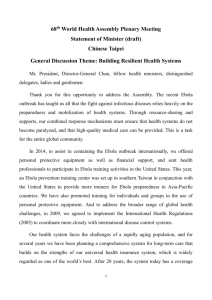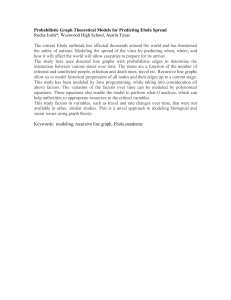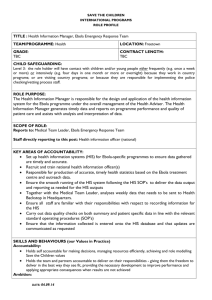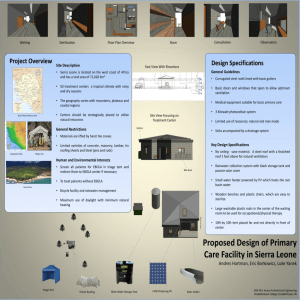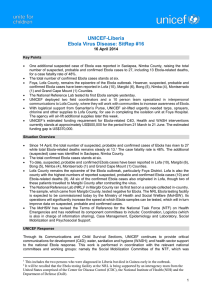Document 12446791
advertisement
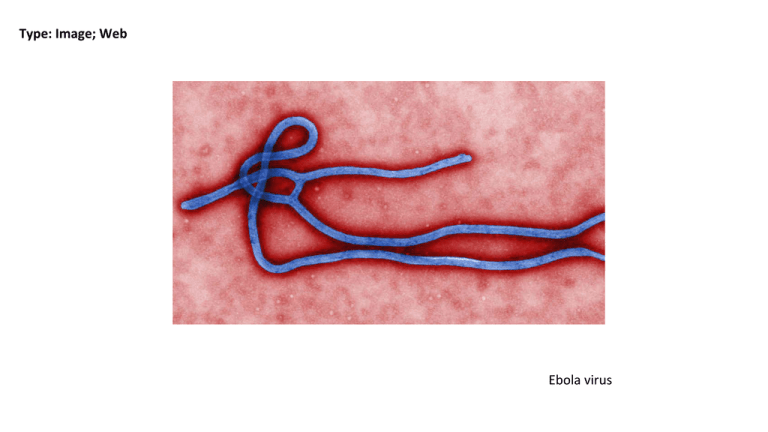
Type: Image; Web Ebola virus Type: Figure; Reuters News Agency Type: Graph / data; Web report Type: Image; Web Type: Image; Web Type: Data; cross-­‐secAonal survey Awareness is high, denial is low, but there are serious misconcep8ons. Everyone in Sierra Leone has heard of Ebola and nearly everyone believes that it exists in the country (97%). About 77% of respondents have heard of someone who survived Ebola. Nonetheless, nearly one-­‐third of respondents believe that EVD is transmiHed by air or through mosquito bites. About 2 in 5 respondents believe that they can protect themselves from Ebola by washing with salt and hot water while nearly 1 in 5 believe that spiritual healers can successfully treat the disease – such belief is more higher in Western Urban and Rural (32-­‐45%) as compared to other parts of the country. Regarding risk percep8ons, 36% believe that they are at no risk of contrac8ng Ebola within the next 6 months while nearly the same propor8on (34%) believes that they are at great risk. UNICEF, FOCUS 1000 and Catholic Relief Services (2014) Study on Public Knowledge, A\tudes, and Prac8ces Rela8ng to Ebola Virus Disease (EVD) Preven8on and Medical Care in Sierra Leone. Type: QualitaAve findings from quanAaAve and qualitaAve study; ScienAfic journal HewleH BS and Amola RP (2003) Cultural Contexts of Ebola in Northern Uganda. Emerg Infect Dis 9(10): 1242 -­‐ 1248 Type: Image; Local Health PromoAon effort Type: Image; Web Type: Image; NaAonal Health PromoAon effort Type: Image; Daily Mail Front Page Type: Image; Web Type: Views from the Public; Daily Mail Comments from Daily Mail ar8cle on UK health care staff working in Ebola-­‐infected areas returning home to UK, Dec 2014 Type: Figure; Reuters News Agency Type: Views/Experiences of a Nurse; Media Clip “I came in the following morning and she was covered in blood. She s8ll had a very puzzled expression on her face… erm, and she wasn’t breathing. So I put her in a bag and leA her next to her brother… She was a beau8ful liBle girl. So my specific fear is that the horror and and the misery of these deaths really fill a well of my despair… and I just, I just don’t know what happens if that’s repeated a million 8mes. And so I say, at all costs, we can’t let that happen.” Quote taken from a video clip of Bri8sh nurse William Pooley recalling his experience trea8ng Ebola in Sierra Leone Type: Views of a Medical Professional; ScienAfic journal The Ebola epidemic has put great strain on the already weak African health infrastructure. Although quarantine measures are seen by some as ensuring the security of their population, it is clear that restrictive measures have the potential to discourage volunteering, reduce humanitarian assignments to west Africa, and stigmatise those travelling from affected countries. A travel ban could also affect research for new treatments and vaccines. Often researchers fly to study sites in Africa before then returning to their home countries; if this movement is restricted it will have a devastating effect on the progress that has been already made in treatment research. Better coordination and planning are urgently needed to avoid expansion of the Ebola outbreak, and to ensure that other endemic diseases are not further neglected. Such coordination will only be possible with a rational and evidence-based response. Editorial, The Lancet Infectious Diseases, December 2014 Type: QualitaAve data; QualitaAve study The community is no longer involved in burying of bodies we call the government burial team to help. People are now avoiding the sick and the dead. The Community Leaders have been making these changes to happen (Montserrado, Banjor, male Focus Group Discussion par8cipant, age 26-­‐63). Before, we did not believe that Ebola was real. AAer so many deaths, followed by awareness on preven8on from the health teams, such as washing hands, no touching dead bodies, avoiding sick persons, we believed...The changes came aAer two months in September 2012 (Lofa, Barkedu, male Focus Group Discussion par8cipant, age 42-­‐80). People do not feel comfortable asking for help because they are afraid of being s8gma8zed or avoided by people...and it has not changed over8me (Montserrado, New Kru Town, male Key Informant interview, age 36). As an imam, I don't only pray for my people, encourage them to keep washing their hands, they should not touch sick people and dead bodies. In the morning, I walk in the community to see whether people have Ebola buckets in front of their houses. Those who don't have, I tell them to get one and at 8mes I recommend them to the Red Cross people to provide for them and they do get (Lofa, Barkedu, chief, imam KI, age ). The aUtude and reac8ons have changed, now community members are encouraging survivors to tell their stories, give them food, clothing and incorporate the survivors in the community task force. (Montserrado, New Kru Town, mixed FGD par8cipant, age 47-­‐64). The government should stop the burning of bodies because it is not part of our culture. (Montserrado, New Kru Town, Chris8an religious leader KI, age). USAID (2014) Community Perspec8ves about Ebola in Bong, Lofa and Montserrado Coun8es of Liberia: Results of a Qualita8ve Study. Type: Image; Web PREVAIL Vaccine Trial, Liberia

